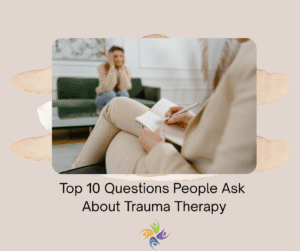 When trauma has made life feel heavy, unpredictable, or unsafe, just thinking about asking for help can feel daunting.
When trauma has made life feel heavy, unpredictable, or unsafe, just thinking about asking for help can feel daunting.
You’re not alone. Many people in Sacramento, Roseville, and Fair Oaks have walked this path before you. In like manner, they ask the same questions, and wonder if healing is possible.
1. What are the signs of unresolved trauma?
Unresolved trauma doesn’t always look like flashbacks or nightmares. Sometimes, it shows up quietly. For instance, in the way you feel, think, or relate to others. It’s the body and mind’s way of saying, “I haven’t fully healed from what happened.”
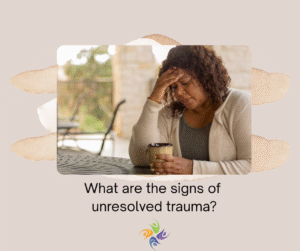 Some common signs include:
Some common signs include:
● Emotional reactivity: Feeling easily triggered, angry, tearful, or anxious. Often more than the situation calls for.
● Numbness or disconnection: Feeling detached from your emotions, your body, or from other people.
● Difficulty trusting or feeling safe: Even in relationships or situations that are actually safe.
● Perfectionism or control issues: Trying to manage everything perfectly to avoid being hurt or vulnerable again.
● Self-blame or shame: A lingering sense that something is “wrong” with you.
● Body symptoms: Chronic tension, stomach issues, headaches, or fatigue. Indeed, the body often stores what the mind can’t process.
● Repetitive relationship patterns: Getting stuck in similar conflicts, dynamics, or unhealthy attachments.
If you recognize yourself in some of these, it doesn’t mean you’re “broken”. It means your system is still protecting you the only way it knows how. The good news is that trauma therapy can help you safely process the past, calm your body, and build new patterns that feel grounded, connected, and free.
2. Do I really need trauma therapy or is this just stress or bad memories?
Trauma isn’t just a “bad memory.” In fact, it can overwhelm your nervous system, alter how you see the world, and show up as insomnia. It also appears as hypervigilance, numbness, flashbacks, or issues in relationships.
If your past is still affecting your present. And you find it’s hard to feel safe in your body or your mind. Therapy for trauma can help you find your way back to calm and integration.
3. What kind of therapist should I see?
Good question. The “type” of therapy matters, especially with trauma.
 Some modalities common in Sacramento, Roseville & Fair Oaks:
Some modalities common in Sacramento, Roseville & Fair Oaks:
- EMDR (Eye Movement Desensitization and Reprocessing) therapy helps your brain reprocess traumatic memories, so they lose their emotional charge.
- Somatic / body-based therapy works with physical sensation, tension, and nervous system activation, not just thoughts.
- Trauma-informed CBT or Trauma-Focused CBT addresses thoughts, beliefs, and safety while you stay attuned to trauma triggers.
- Internal Family Systems (IFS), Sensorimotor, Polyvagal-informed many therapists blend modalities that also include mindfulness and stress reduction techniques.
A good therapist will tailor the approach to your pace, safety, and your body’s needs.
4. How do I know if this therapist is safe and competent with trauma?
Here are red flags & green flags:
Green flags:
- They use words like “trauma-informed,” “EMDR trained,” “Brainspotting trained,” or “PTSD” in their specialties (many therapists in Sacramento list these on their bios).
- They talk about safety, pacing, and helping you have a safe spot before diving into deep memory work.
- Therapists will ask about your triggers, physical reactions, and consent.
- Then they offer a free consultation to see if you have a mutual fit.
Red flags:
- Rushing you into recalling trauma without first building stability.
- Ignoring your nervous system, body, or reactions.
- Dismissing side effects or emotional overwhelm.
- Using “one size fits all” trauma scripts without adapting them to you.
5. What will happen in the first few sessions?

- We’ll meet you where you are. First, we understand your story, what’s safe to share, and your healing goals.
- Then we’ll begin stabilization work: grounding, emotion regulation, parts work. As well we will build a window of tolerance (so the body can stay regulated).
- Together you will develop a plan together: which modalities, pacing, how to measure progress.
- We’ll agree on boundaries, safety, and pace so you always feel that you have choice.
6. Will it make me feel worse before it gets better?
Sometimes yes. Opening trauma gently can bring up discomfort, sadness, or overwhelm.
But in a safe container, with pacing, support, and regulation tools, that discomfort becomes a bridge to healing, not a trap.
Therapy is not about pushing you beyond your threshold but expanding your window of capacity over time.
7. How long will it take to heal from trauma?
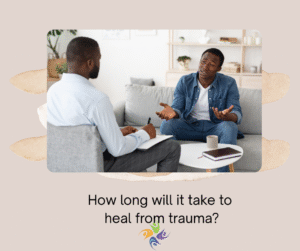
You might notice shifts in months, but deeper integration often takes years.
Our work will be measured in relief, safety, trust. That is to say it’s measured in new capacities and not arbitrary session counts.
8. Do I need medication or a psychiatrist, too?
Medication isn’t mandatory, but some folks benefit from it. Especially when trauma overlaps with depression, anxiety, or PTSD symptoms.
As a therapist, I do not prescribe medication but can help you decide if you might benefit. If needed, I can coordinate with psychiatrists or medical providers. At the same time, it is up to you. Therapy is not about choosing one or the other. It’s about finding a combination (if needed) that gives you more stability and resilience.
9. Can trauma therapy help me feel safe in relationships again?
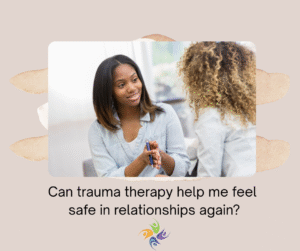
Healing includes reclaiming your capacity for closeness, choice, vulnerability, and authentic relating.
10. “Will I ever feel like myself again—healed?”
Yes. Healing from trauma doesn’t mean erasing what happened or pretending it’s gone. It means integrating your story, reclaiming your agency, and building a present where you feel safe, embodied, and connected.
You can move from surviving to living. To be sure with more freedom, trust, and wholeness.
Begin Trauma Therapy in Sacramento / Roseville / Fair Oaks
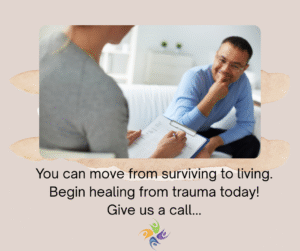
At the Relationship Therapy Center, we guide adults and couples from overwhelm, fragmentation, and struggle into safety, connection, and integration.
We serve clients in-person in Roseville / Fair Oaks / the greater Sacramento area, and online across California, using trauma-informed, somatic, EMDR, and relational methods.
You don’t have to carry this alone anymore.
💬 Schedule a free consultation or first session and let’s begin the journey home to yourself.
Nancy Ryan, LMFT and Certified Gottman Therapist has been providing therapy for over a decade in the Greater Sacramento area. She is now Director of the Relationship Therapy Center where she guides and mentors a staff of over 15 therapists. We have therapists at our in person locations in Roseville, CA and Fair Oaks, CA and online in California and online in Washington that can help with trauma today.
Other Services Offered at The Relationship Therapy Center in California:
In addition to anxiety therapy, Our Sacramento area counseling clinics located in Roseville and Fair Oaks, CA are pleased to offer a variety of mental health services. Our couples services include: Counseling after infidelity, sex therapy, co-parent counseling, family therapy, divorce counseling, intensive couples retreats, and premarital counseling. Individual therapy services include, therapy for children, teen therapy, depression treatment, and individual relationship counseling. Our therapists offer online counseling in California to treat a variety of mental health concerns. Please reach out to our Sacramento area therapy office to learn more about the many ways we can help you or your loved ones heal and grow.
- Can a Marriage Counselor Save a Marriage? - February 26, 2026
- Is Our Communication Bad Enough for Therapy? - February 19, 2026
- What are Examples of Trauma? - February 12, 2026

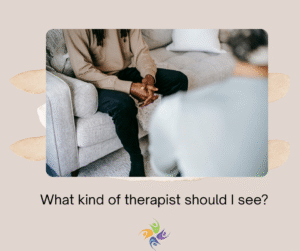 Some modalities common in Sacramento, Roseville & Fair Oaks:
Some modalities common in Sacramento, Roseville & Fair Oaks: